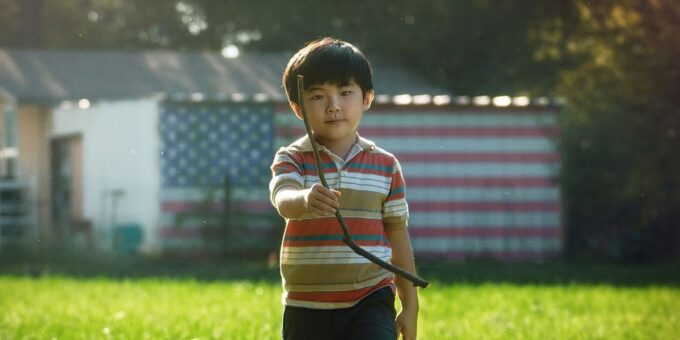Written By: Jeremy Lim
A touching and heartfelt story about what it means to be a Korean American immigrant, Lee Isaac Chung’s “Minari” takes an incredibly personal account of Arkansas in the 1980s and turns it into something that can be understood by all.
The film opens with the Yi family as they drive up to their new home, a mobile home in the middle of nowhere. Their new home is not particularly spacious and it’s not exactly glamorous either, but with a certain childlike optimism, the two children David and Anne (played by Alan Kim and Noel Kate Cho) run over to the wheels and revel in the new and unfamiliar. While Jacob (Steven Yeun), the patriarch of the family, shares a similar enamorment when looking at what is now theirs, Monica (Han Ye-ri) is less than impressed.
The Yi family is shown to be like a lot of lower-middle class families. The parents slave away at a chicken sexing plant day after day to ensure a better life for their kids while the kids navigate and adjust to a brand new way of living. There is little in the way of real luxury here but Chung manages to cut through all of that and injects a real sense of wonder and beauty into everything.
The first scene sets up all of the characters in a way that instantly gives the audience a peek into who these people are. David and Anne are young and relatively carefree, just following their parents along wherever they go. Jacob is a proud man who is ready to bet on himself and be his own boss. At one point, Jacob even pulls David aside at the plant and tells him, “Male chicks don’t taste good. They can’t lay eggs and have no use. So, you and I should try to be useful.” It’s clear very early on that Jacob wants to matter in the family; he wants to prove to his kids, his wife and everybody else that he matters. Monica is a mother who loves her family unconditionally but is weary of leaving their stable life in California for this mobile home, asking Anne, “Isn’t the city better?”

Right from the jump, the colors that Chung captures pop off the screen, and as the movie slowly moves along, those same colors help form the emotion of a scene. When the Yi family first walks out of their car and into the Arkansas wilderness, there is a sense of hope associated with what we see. The two children are enveloped entirely by green and blue, as they are knee-deep in grass, swallowed up by the forest behind them. Later on, that same exact grass in combination with the night sky builds a feeling of longing and failure when the Yi family starts to encounter hardships.
Chung’s striking use of color doesn’t stop there. What struck me about this film was the sharp use of red, white and blue throughout, whether that color comes from the environment or the wardrobe. The colors don’t always come from the same character or source in a particular scene, but they are always present.
This color motif is a great way to show the complexity of the characters portrayed in the film. Red, white and blue are obviously associated with the American flag, but it also represents the colors of the Korean and Arkansas flag. The Yi family is in a unique position where they feel the burden of integrating all three of those distinct cultures together, and the colors that the characters are always wearing or surrounded by alone show the plight of the immigrating parents and their first-generation Korean American children.
This clashing of cultures is also present in the different kinds of foods shown in the film. While Jacob is busy growing Korean fruits and vegetables, Monica is busy cooking up classic Korean dishes for dinner. On the other hand, when the two parents are out and about at work during the day, the two kids revert to what they know more, which are snacks ingrained in classic Americana. Both David and Anne are seen consuming copious amounts of canned pasta and Mountain Dew, described as “water from the mountains” by the older sister. In one scene, young David is even seen eating what looks like a banana wrapped in a Kraft single. Without needing to bring it up in dialogue, Chung shows just how different the parents and the kids of the Yi household are living their lives.
After a swift beginning that includes the introduction of Paul (Will Patton), a cooky, evangelical Christian who is hired by Jacob to work with him on his new farmland, Monica’s mother Soon-ja (played by Youn Yuh-jung) arrives and steals the show. Portraying a zany Korean grandmother who swears like a sailor, Yuh-jung shows her outstanding range by bringing a brisk levity to the film while also shining in the picture’s most emotional and sentimental moments, of which there are many. She brings a manic energy that comes off strong and rubs the children the wrong way but slowly reveals itself to be filled with heart and soul, as a grandma always is.
When the grandmother enters the picture, so does the titular “minari” plant. Minari, also known as water dropwort or Chinese celery, is popular in East Asia and has a ton of uses. As Soon-ja tells David in the film, “Minari can be put in kimchi, put in stew, put in soup. It can be medicine if you are sick.” The minari plant becomes a beacon of Korea in this rural part of Arkansas and it helps David and the rest of the family connect back to their roots.
Using extremely specific references to both Korean culture and cuisine, “Minari” does something that is very hard to do. The film manages to craft a tale that feels uniquely Korean American, but also universal with the themes that are being tackled: familial responsibility, the desire for a better life for your children, what it truly means to “be a man.” Lee Isaac Chung questions all of this with a feeling of gentleness, force, and beauty that rivals films like Terrence Malick’s 1978 classic “Days of Heaven.”
Like Malick before him, Chung expertly uses nature and the environment around his characters. In this film, he manages to show the dichotomy between what an immigrant is promised and what an immigrant is delivered. The immigrant experience is known to be a tough one for all involved, but Chung shows a splendid understanding of how to carefully coax out the elegance of the situation.
To quote Soon-ja from the film, “Minari is wonderful, wonderful!” Whether you are of Korean descent or not, Lee Isaac Chung’s labor of love will have you calling everybody in your family tree by the time credits roll.
“Minari” is available at limited theaters and on A24’s Screening Room on February 12th. “Minari” will also be available on demand on February 26th.

